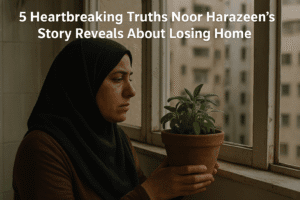Displacement Horror: 5 Heartbreaking Truths Noor Harazeen’s Story Reveals About Losing Home
Noor Harazeen, a Palestinian journalist who escaped Gaza for Cairo a year ago, grapples with profound survivor’s guilt despite relative safety. Alongside over 100,000 displaced Gazans in Egypt, she lives torn between gratitude for refuge and anguish for family and friends enduring relentless hardship back home. A simple pot of Gazan sage provides a vital, sensory tether to her shattered homeland, a small comfort against the constant mental torment of separation. Her deepest fixation is the Rafah border’s reopening – a symbol of hope eclipsing rational fears of returning to destruction and scarcity.
Haunting parallels emerge as she recalls her grandmother’s 1948 displacement, fearing her own exile might become another generational Nakba. For Noor, true belonging outweighs survival’s comforts; her unwavering need is to return to Gaza’s soil, carrying its essence for herself and her children.

Displacement Horror: 5 Heartbreaking Truths Noor Harazeen’s Story Reveals About Losing Home
The scent of sage rises from a weathered pot on a Cairo windowsill—an ordinary herb transformed into a sacred relic. For Noor Harazeen, this humble plant anchors her to a Gaza she can no longer touch. One year after escaping Israel’s bombardment, the Palestinian journalist embodies the cruel paradox of refuge: safety purchased with soul-crushing guilt.
The Unbearable Arithmetic of Survival
Noor’s Cairo apartment offers electricity, clean water, and silence from drones—luxuries unimaginable to her family still trapped in Gaza. Yet every comfort deepens her anguish. “Grateful but haunted” defines her existence, echoing the silent torment of over 100,000 displaced Gazans in Egypt. Their shared trauma isn’t just what they fled, but who they left behind. Survivor’s guilt becomes a language spoken in glances at checkpoints.
The Fragility of Home
Her ritual of tending sage—”meramie” in Gaza’s dialect—reveals displacement’s invisible wounds. This plant isn’t nostalgia; it’s resistance against erasure. As homes vanish beneath rubble, refugees cling to sensory lifelines: a taste, a scent, a cadence of speech. Noor’s pot embodies what statistics obscure: homeland isn’t geography, but the smell of your grandmother’s kitchen.
Walking with Ghosts
When Noor describes families fleeing past Israeli tanks and corpses near Al-Bureij camp, her voice shifts. These aren’t news reports—they’re family heirlooms. Her grandmother’s Nakba stories now mirror her reality: generations bound by the same unanswered question, “Will we return?” History’s cruelest repetition isn’t violence, but the inheritance of exile.
The Border in the Mind
For Noor, ceasefire talks boil down to one concrete obsession: Rafah’s gates. Will Israel control them? Can she walk back through? This narrow crossing has become psychological terrain—a symbol of agency stripped from refugees. Her longing defies rationality: she’d trade Cairo’s stability for a tent in Gaza’s ruins. Because belonging, she implies, outweighs survival.
Why This Resonates Beyond Gaza
Noor’s story illuminates truths of forced displacement everywhere:
- Guilt is the hidden tax of escape
- Safety amplifies the voices of those left behind in your mind.
- Home lives in sensory fragments
A plant, a recipe, a childhood rhyme become cultural life rafts.
- Return is a non-negotiable need
Even when “home” is rubble, the body demands its soil.
- Borders dictate inner worlds
A closed gate isn’t just political—it’s a wound to identity.
As Noor inhales sage steam at dawn—”to remember where my children come from”—we glimpse displacement’s core truth: Refugees carry homelands within long after maps erase them. The real border isn’t at Rafah, but between the life saved and the self left behind.
You must be logged in to post a comment.